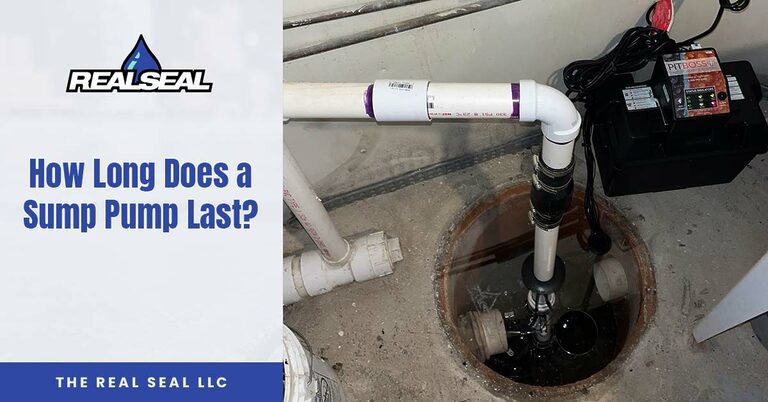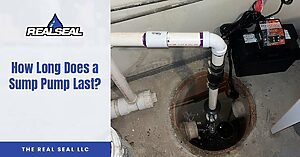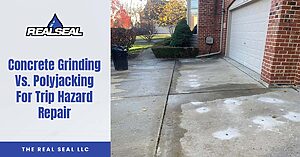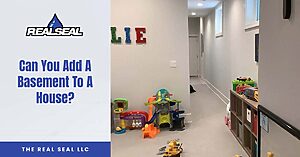Looking for information about how long does a sump pump last? If so, don’t hit that back button because you’ve landed on the right page. In this article, we’ll review sump pumps, how they work, how long they last, common sump pump problems, and more.
What Is a Sump Pump?
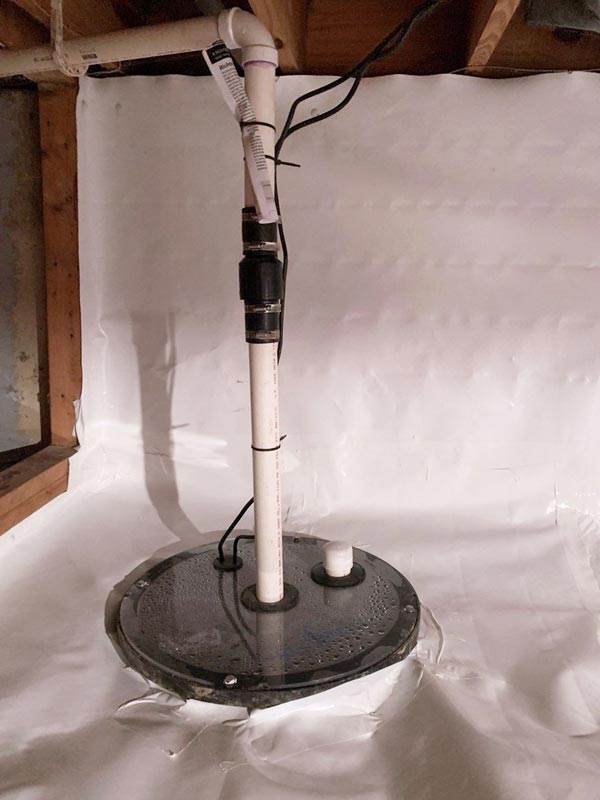
A sump pump is a mechanical device designed to remove excess water that collects in the lowest point of a basement, crawlspace, or other area prone to flooding. The pump sits in a pit called a sump basin, which must be dug and installed below the floor level. Water enters the basin through a drain tile system and is then pumped out, away from the foundation, through a discharge pipe. Sump pumps are essential for preventing flooding and associated water damage.
There are two main types of sump pumps: pedestal and submersible. Pedestal pumps have a motor that sits above the pit and a hose that extends down into the water. Submersible pumps are designed to be fully submerged in water.
Sump pumps can be powered by electricity or battery backup. It’s essential to have a backup power source in case of power outages.
Regular sump pump maintenance is important to ensure it’s functioning correctly. This includes checking the float switch, cleaning debris from the pit and pump, and testing the backup power source.
How Do Sump Pumps Work?
A sump pump is a component of a drain tile system, a network of perforated drainage pipes strategically placed around the perimeter of the foundation at the footing level. They collect excess groundwater and direct it toward the sump basin (or pit).
The water level will rise as the groundwater flows into the sump pit. Eventually, the sump pump will activate and force water through a discharge pipe and away from your foundation.
During a heavy rain storm, a sump pump will usually work continuously. Once the rain stops, the water in the sump pit will decrease, and the sump pump will switch off. During a drought, your sump pump won’t turn on at all.
How Long Does a Sump Pump Last?
On average, a sump pump lasts 7-10 years. However, various factors can cause a sump pump to malfunction early. For instance, frequent power outages, poor maintenance, and high water usage levels can cause the motor to overwork, shortening its lifespan. Additionally, sump pumps can become clogged with debris or corroded with minerals found in hard water, leading to reduced performance or a complete shutdown.
To ensure your sump pump lasts as long as possible, it’s crucial to carry out regular maintenance. Common sump pump maintenance practices include:
- Cleaning the sump pit
- Ensuring the float switch works correctly
- Testing the pump regularly
- Replacing worn-out parts
Also, investing in a battery-powered backup generator is advisable to ensure the sump pump remains functional during a power outage.
How Often Should a Sump Pump Be Replaced?
The answer to this question depends on many factors, including the type of sump pump, the manufacturer’s recommendations, and the amount of use. As noted above, most sump pumps last approximately 7- 10 years. However, some factors can significantly affect the life expectancy of your sump pump, including the frequency of its use and the quality of its maintenance.
If your sump pump runs frequently, it will likely wear out faster, requiring replacement sooner. On the other hand, if your sump pump runs less frequently, it may last longer than ten years.
Regular maintenance, which includes cleaning and inspecting the pump as well as testing its alarms and switch performance, can increase its lifespan and efficiency.
It goes without saying that it’s essential to consider the quality and reputation of the manufacturer when purchasing a new sump pump. A high-quality sump pump from a trusted manufacturer will likely last longer and require fewer repairs than a lower-quality option. You can also check out how many sump pumps you may need at once, depending on the severity of your house’s situation and needs.
Common Sump Pump Problems
Common problems homeowners face with sump pumps include the following:
- The sump pump fails to turn on when it should – Various factors, including a problem with the float switch, can cause this. Perhaps the float switch is surrounded by debris. Check to ensure the sump pit has a tight-fitting cover to keep debris out.
- The sump pump runs continuously – Another common problem is a sump pump that runs continuously, even when there’s no water in the basement. If your pump is running continuously, this could indicate it’s time for a replacement.
- The discharge line is clogged – Clogs are another frequent issue with sump pumps, particularly in the discharge line. If the pump can’t correctly expel water due to a clog, it can lead to a flooded basement or crawl space.
Other problems that may arise include a pump that’s too small or too large for the intended application, incorrect installation, or a malfunctioning check valve.
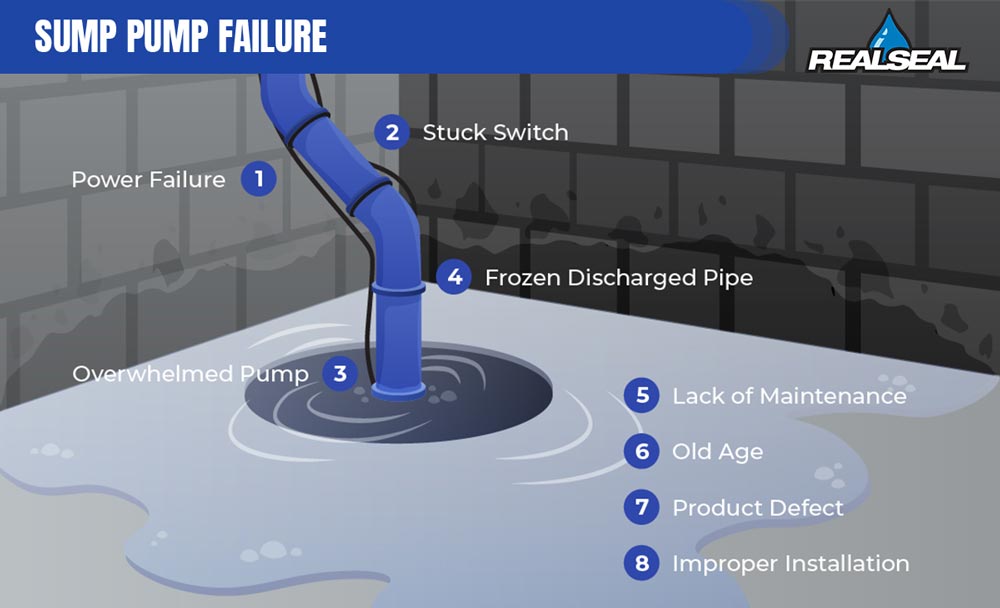
Regularly maintaining and inspecting your sump pump can help mitigate these common issues.
Sump Pump Maintenance
Many homeowners overlook the importance of maintaining their sump pumps until it’s too late. Regular DIY sump pump maintenance can save you from costly repairs and prevent basement flooding.
To keep your sump pump in good condition, here are some DIY maintenance tips to follow:
- Regularly inspect the pump – Check your sump pump every three to four months to ensure it’s functioning correctly. First of all, make sure it’s standing upright. Then, look for any signs of rust, corrosion, or damage, and examine the power cord for any frays.
- Clean the sump pit – Dirt and debris can accumulate in the sump pit, causing clogs and reducing the pump’s efficiency. Regularly clean the sump pit and remove any debris that may affect the pump’s operation.
- Test the pump – To ensure your sump pump works optimally, pour a bucket of water into the sump pit and observe the pump’s action. The pump should turn on automatically and quickly expel the water away. If the sump struggles to do this, call a professional.
- Maintain the discharge line – The discharge line is responsible for transporting water away from your property. Regularly check the line for clogs, and ensure it’s correctly installed and angled away from your home.
Should I Have a Battery Backup for My Sump Pump?
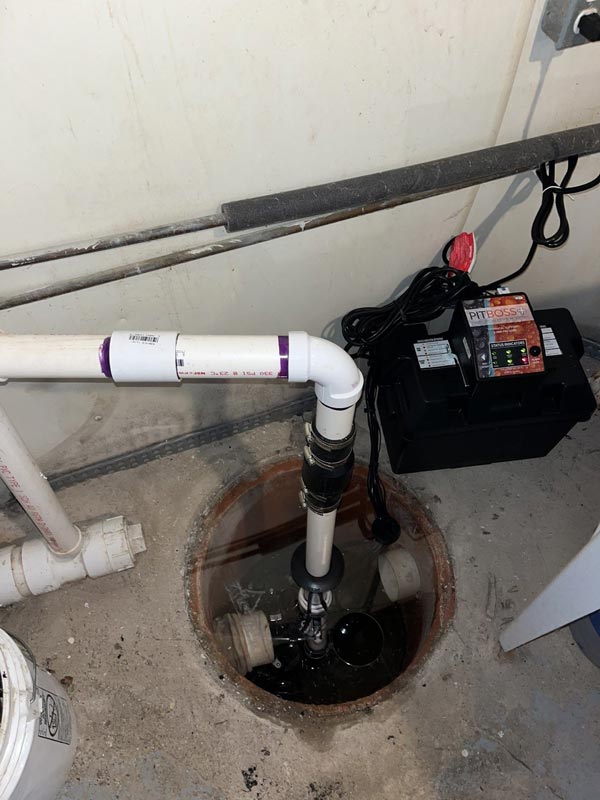
Yes, you should have a battery backup for your sump pump to ensure the pump continues to work even during a power outage. This is particularly important if you live in a region that experiences frequent storms or power outages. Without a backup system, your sump pump may fail, and you could end up with a flooded basement or crawl space. Our battery backup systems monitor the sump pump’s health and alert you when there’s an issue.
The type of battery backup system you choose will depend on the amount of backup power required and your budget. Some systems offer limited backup power for a few hours, while others can provide power for several days. The cost of the system varies depending on the type and size of the battery and the brand.
While it’s not a substitute for regular maintenance, our battery backups test the pumps monthly, keep logs, monitor A/C draw, water level, gallons of water ejected, battery level, and if there’s an issue with the primary pump.
It’s still important to check the discharge line, ensure there’s no debris in the pit, and to review the data on the app every month to ensure it’s working.
You should still inspect and test your sump pump regularly to ensure it works properly. A backup system is simply an extra layer of protection against power outages and severe weather conditions.
If you have a question about using a sump pump in your Chicagoland home, contact The Real Seal today to schedule an evaluation.
